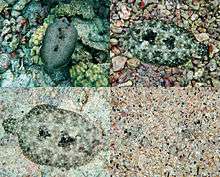List of military clothing camouflage patterns
.jpg)
1931 Splittertarnmuster (splinter pattern) first used for tents, then parachutists' jump smocks, and finally for infantry smocks
This is a list of military clothing camouflage patterns used for battledress. Military camouflage is the use of camouflage by a military force to protect personnel and equipment from observation by enemy forces. Textile patterns for uniforms have multiple functions, including camouflage, identifying friend from foe, and esprit de corps.[1]
The list is organized by pattern; only patterned textiles are shown. It includes current and past issue patterns, with dates; users may include armed, paramilitary, police, firefighting, search and rescue, counter-insurgency/counter-terrorism and other security forces and emergency services.
Patterns
| Name | Family | Image | Issued | Users |
|---|---|---|---|---|
| Australian Multicam | Woodland |  | 2014 | Australia[2] |
| Airman Battle Uniform (ABU) | Digital Tigerstripe | 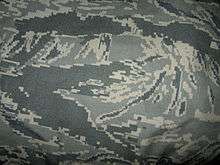 | 2011 | United States Air Force |
| Bundeswehr Tropentarn (3-Farb-Tarndruck) | Flecktarn |  | 1993 | German Bundeswehr:[3] tropical battle dress uniform for desert and semi-arid regions (army and air force) |
| Canadian Disruptive Pattern (CADPAT) | Digital | .jpg) | 2002 | Canada. Temperate variant shown.[4] |
| Camouflage Europe Centrale | Woodland |  | 1991 | France, Austria[5] |
| Desert Night Camouflage | | 1991 c. | United States[6] | |
| Disruptive Pattern Material | DPM | 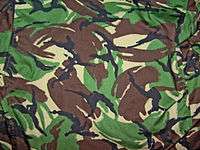 | 1969 | Britain, DPM-95 shown. It replaced similar 1960 pattern DPM, introduced in 1969.[7] Replaced by Multi-Terrain Pattern. Iceland,[8] Indonesia, Netherlands, New Zealand, Philippines, Russia, Yemen. |
| Erbsenmuster | Flecktarn | .jpg) | 1944 | Germany[9] |
| ERDL (M1948) | Woodland |  | 1967 | Singapore Armed Forces[10] Turkish Armed Forces late 1980s-1990s[11] |
| Flächentarnmuster, also called Kartoffelmuster (potato), or Blumentarn (flower) | Flecktarn | | 1956–1967 | East Germany: National People's Army[12] |
| Flecktarn | Flecktarn | 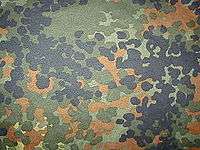 | 1990 | Germany,[13] and at least 16 variants in different countries. Albania;[14] Belgium;[15] China until 2007;[16] Denmark 3-color variant;[17] France;[18] India;[19] Japan;[20] Kyrgyzstan;[21] Poland;[22] Russia;[23] Greece, Ukraine. |
| Frog Skin/Spot | Frog Skin |  | 1942 | United States. Reversible: 5-color jungle one side, 3-color beach the other.[24] Also used by Turkey until 1980s in different colorways.[11] |
| Jigsaw | Puzzle | .jpg) | 1956 | Belgium[25] |
| Leibermuster | 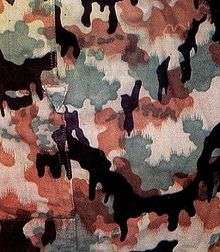 | 1945 | Germany[26] | |
| Lizard | Lizard | 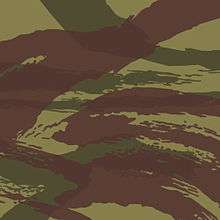 | 1947 | France[27] Many variants, both with horizontal stripes (Chad, Gabon, Rwanda, Sudan, Cuba, Congo, Greece) and with vertical stripes (Portugal 1963, then Egypt, Greece, India, Lebanese Palestinians, and Syria). Vietnam era Tigerstripe is a variant of Lizard.[27] |
| M05 | Digital | 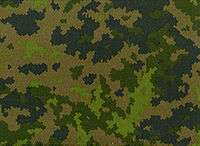 | 2007 c. | Finland[28] |
| M84 | Flecktarn |  | 1984 | Denmark; 9 color variants.[29] Estonia:[30] France;[17][31][32] Latvia;[30] Lithuania;[30] Russia;[17] Sweden;[33] Turkey[34] |
| M90 | Splinter | 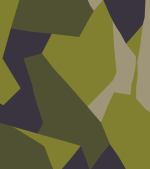 | 1989[35] | Sweden;[36] Latvia;[37] |
| Marine Pattern (MARPAT) | Digital | 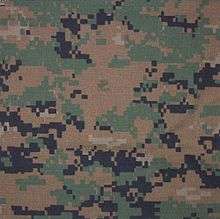 | 2002 | United States Marine Corps, based on CADPAT.[38][39] |
| MultiCam | Woodland |  | 2002 | U.S. Armed Forces,[40] Angola,[41] Brazil,[42] Australia,[43][44] Austria,[45] Denmark,[17][29] Montenegro,[46] New Zealand,[47] Panama,[48] South Korea,[49] Thailand,[50] Tunisia,[51] Turkish Navy[11]Azerbaijani Armed Forces |
| Multi-Terrain Pattern | MTP (MultiTerrainPattern) | 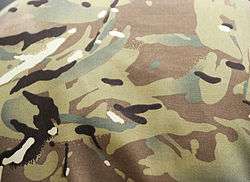 | 2010 | British Armed Forces[52] |
| Platanenmuster | Flecktarn |  | 1937 | Germany: summer (shown) and autumn variants.[9] |
| Rain pattern | Rain | | 1960 c. | Warsaw Pact countries: Poland (“deszczyk”), Czechoslovakia (“jehliči”), East Germany (“Strichtarn”), and Bulgaria[53][54] subsequent use: Uzbekistan, Kazakhstan |
| Rhodesian Brushstroke | Brushstroke | 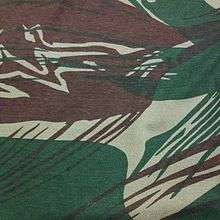 | 1965–1980 | Rhodesia[55] |
| Six-Color Desert Pattern (Chocolate Chip) | Chocolate Chip | 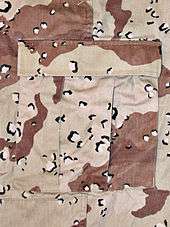 | 1980s | United States[56] Used by many other armies in many colour and pattern variations, including Argentina, Dominican Republic, El Salvador, Kuwait, Niger, Paraguay, Peru, China, Egypt, Eritrea, Iran, Iraq, Jordan, Kazakhstan, Libya, Pakistan, Philippines, Rwanda, Saudi Arabia, Somalia, South Korea, Spain, UAE, Yemen.[57] |
| Soldier 2000 | Woodland | 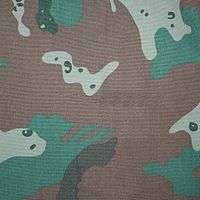 | 1994 | South Africa[58] |
| Splittermuster | Splinter | .jpg) | 1931 | Germany 1941–1944 (Wehrmacht, SS)[59] |
| Scorpion W2 (OCP) | Woodland |  | 2015 | United States, replacing Universal Camouflage Pattern.[60] |
| Tactical Assault Camouflage (TACAM) | Woodland | | 2004 | U.S. National Counterterrorism Center[61][62] |
| TAZ 90 | Woodland |  | 1990s | Switzerland[63] |
| Telo mimetico | Woodland precursor | 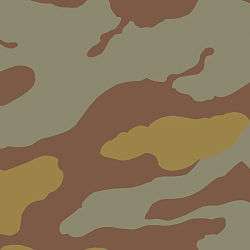 | 1929 | Italy, for shelter-halves, then uniforms. Oldest mass-produced camouflage pattern.[64] |
| Tigerstripe | Tigerstripe |  | 1969 c. | South Vietnam, US special forces in Vietnam. Based on Lizard. Many variants. Also used by Australia, New Zealand in Vietnam.[65][66] |
| Turkish pattern | semi-Digital |  | 2008 c. | Turkish Armed Forces[67] 5 variants[11]Azerbaijani Armed Forces |
| Type 99 (China) | Woodland | 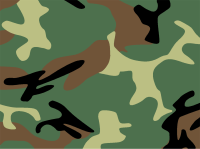 | 1999 | China[68] |
| Type 07 (China) | Digital |  | 2007 | China. Ocean variant shown.[68] |
| Universal Camouflage Pattern | Digital | 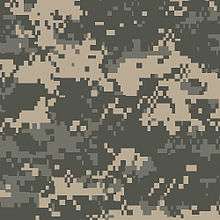 | 2004–2014 | United States, based on MARPAT.[69]Azerbaijani Armed Forces |
| US Woodland (M81) | Woodland | 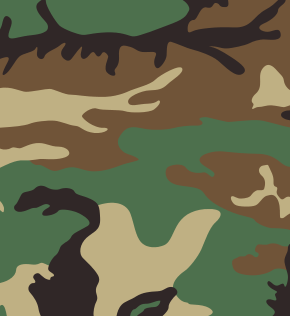 | 1981 | United States, derived from ERDL.[70] Luxembourg;[71] Also used by Turkey until mid-2000s in 3 colorways.[11]Azerbaijani Armed Forces |
| wz. 68 Moro |  | 1969–1989 | Poland; 6 variant colorways.[72][73][74] | |
| wz. 89 Puma | 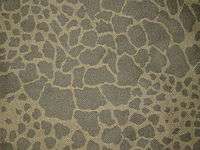 | 1989–1993 | Poland[75] | |
| wz. 93 Pantera | Woodland | 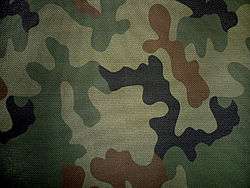 | 1993 | Poland[76] |
References
- ↑ Brayley, Martin J. (2009). Camouflage Uniforms: International Combat Dress, 1940–2010. Ramsbury: Crowood. ISBN 1-84797-137-7.
- ↑ "Australia - Soldier Systems Daily | Australian Multicam Camouflage Uniform Officially Launched". soldiersystems.net. Retrieved 2015-02-14.
- ↑ "Uniformen der Bundeswehr" (in German). Bundeswehr. Retrieved 22 August 2016.
- ↑ CADPAT on the Canadian Army website
- ↑ "French CCE Camouflage T-shirt". Epic Militaria. Retrieved 26 March 2016.
- ↑ "Desert Night Camouflage Trousers, Size: Small Long, NSN: 8415-01-102-6290". Military Steals and Surplus. Retrieved 26 March 2016.
- ↑ "Trousers, Camouflage DPM Combat Dress 1968 pattern". Imperial War Museum. Retrieved 31 October 2015.
- ↑ "Iceland". SFOR Informer Online. NATO. Retrieved 27 March 2016.
- 1 2 Newark, Tim (2007). Camouflage. Thames and Hudson. pp. 133–137. ISBN 978-0-500-51347-7.
- ↑ Singapore_ERDL
- 1 2 3 4 5 "Turkey". Camopedia. Retrieved 13 October 2014.
- ↑ "East German Camouflage Patterns". Henrikc.dk. 2011-12-31. Retrieved 2012-02-20.
- ↑ Newark, Tim (2007). Camouflage. Thames and Hudson, with Imperial War Museum. ISBN 978-0-500-51347-7. Page 157.
- ↑ "Albania". SFOR Informer Online. NATO. Retrieved 27 March 2016.
- ↑ Camopedia: Belgium
- ↑ Camopedia: China
- 1 2 3 4 "Danish M/84 "Pletsløring" camouflage pattern". Strike - Hold!. Retrieved 1 April 2016.
- ↑ Camopedia: France
- ↑ Camopedia: India
- ↑ Camopedia: Japan
- ↑ Camopedia: Kyrgyzstan
- ↑ "КАМУФЛЯЖ URBAN FLECKTARN". Camo-info. Retrieved 27 March 2016.
- ↑ Camopedia: Russia
- ↑ Eastman: Frog Skin pattern
- ↑ "Belgian Camouflage Patterns". Camopedia. Retrieved 26 March 2016.
- ↑ Richardson, Francis. (1945). Camouflage Fabrics both Plain and Printed for Military Use by the German SS and German Army. Reprinted in: Borsarello, J.F. (Ed.). (1990?). SS & Wehrmacht Camouflage, ISO Publications; London.
- 1 2 "Lizard". Camopedia. Retrieved 25 March 2016.
- ↑ Licence of M05/M04 Design at site of National Board of Patents and Registration of Finland
- 1 2 "First Official Look at the New Danish Uniform". Krigeren (in Danish). Retrieved 27 February 2015.
- 1 2 3 "Baltics and Danes live, task together". SFOR Informer Online. NATO. Retrieved 27 March 2016.
- ↑ "Recruitment Campaign 2014/2015". Facebook. Retrieved 18 February 2016.
- ↑ "13e Régiment de Dragons Parachutistes". le.cos.free.fr/ (in French). Retrieved 18 February 2016.
- ↑ "Swedish National Task Force (Nationella insatsstyrkan) during the hunt for cop killer Tony Olsson and other convicts after an escape at the Hall institution.". military66.com. Retrieved 27 March 2016.
- ↑ "Yenigün" (in Turkish). Retrieved December 16, 2014.
- ↑ "Sweden". Camopedia. Retrieved 2 June 2016.
- ↑ "Swedish M/90 and M/90K camouflage". Strike – Hold!. April 11, 2009.
- ↑ "Latvia". SFOR Informer Online. NATO. Retrieved 27 March 2016.
- ↑ Blechman, Hardy; Newman, Alex (2004). DPM: Disruptive Pattern Material. Department of Publications. ISBN 0-9543404-0-X.
- ↑ Jontz, Sandra (February 24, 2001). "Marines' followed Canadians' example in use of digitally-designed 'cammies'". Stars and Stripes. Archived from the original on December 27, 2007. Retrieved 14 January 2010.
- ↑ "US Army Camouflate Improvement Effort Update". 24 July 2013.
- ↑ "GRUPO MILÍCIA, 20 ANOS DE ACTIVIDADE | Operacional". operacional.pt. Retrieved 2015-09-06.
- ↑ "Conheça o treinamento do Comando de Operações Táticas da Polícia Federal (COT) | Fotos | VEJA.com". veja.abril.com.br. Retrieved 2015-09-06.
- ↑ New combat uniform makes troops job easier, Australian Department of Defence, 19 November 2010.
- ↑ Land Warfare Conference - Minister for Defence Materiel, Australian Department of Defence, 19 November 2010.
- ↑ "50 JAHRE JAGDKOMMANDO | DOPPELADLER.COM". doppeladler.com. Retrieved 2015-09-06.
- ↑ "Montenegro Military in MultiCam - Soldier Systems Daily". soldiersystems.net. Retrieved 2015-09-06.
- ↑ Cheng, Derek (2 July 2011). c_id=1&objectid=10735872 "SAS war kit blows away military fans" Check
|url=value (help). The New Zealand Herald. Retrieved 2011-07-02. - ↑ http://www.flickr.com/photos/kormnd/8399595823/in/set-72157632569761987 ROK Ministry of National Defense, Defense Media Agency flickr page, 2013,01,18
- ↑ "กองบัญชาการกองทัพไทย". web.archive.org. Retrieved 2015-09-06.
- ↑ https://fbcdn-sphotos-e-a.akamaihd.net/hphotos-ak-ash3/t1/1017130_644308915626419_1996219481_n.jpg
- ↑ Copping, Jason (20 December 2009). "British Army to get new uniforms – turned down by the US and made in China". The Daily Telegraph. Retrieved 22 January 2014.
- ↑ Shuck, David (27 January 2015). "Understanding Camo: The 13 Patterns to Know". Heddels.com. Retrieved 26 March 2016.
- ↑ "Rain patterns". Camopedia. Retrieved 26 March 2016.
- ↑ Baumbach, Johannes (2012). Sparks, Emma, ed. Advances in Military Textiles and Personal Equipment. Cambridge: Woodhead Publishing. pp. 80–81. ISBN 978-1845696993.
- ↑ United States Army (2005). "Army Regulation 670-1: Wear and Appearance of Army Uniforms and Insignia" (PDF). United States Department of Defense. Archived from the original on April 28, 2005. Retrieved April 28, 2005.
- ↑ "Chocolate Chip Camouflage". Camopedia. Retrieved 26 March 2016.
- ↑ Camopedia: South Africa
- ↑ German Army Uniforms and Insignia 1933-1945, Brockhampton Press (2000), ISBN 978-1-86019-869-4
- ↑ Tan, Michelle (3 April 2015). "Army chief shares update on new camo rollout". Army Times.
- ↑ "HyperStealth Biotechnology Corp". Hyperstealth.com. Retrieved 2012-02-20.
- ↑ Crane, David (15 March 2005). "Robo-Soldier Ready for Combat Deployment to Iraq for Urban Warfare/CI Ops". Defense Review. Retrieved 26 March 2016.
- ↑ "Swiss Camouflage Patterns". Camopedia. Retrieved 26 March 2016.
- ↑ "Italian Camouflage Patterns". Camopedia. Retrieved 26 March 2016.
- ↑ McNab, Chris (2002). 20th Century Military Uniforms (2nd ed.). Kent, UK: Grange Books. ISBN 1-84013-476-3.
- ↑ Johnson, Richard Denis (1999). Tiger Patterns: A Guide to the Vietnam War's Tigerstripe Combat Fatigue Patterns and Uniforms. Schiffer Pub Ltd. ISBN 978-0-7643-0756-0.
- ↑ http://haber.gazetevatan.com/Turk_Ordusuna_yeni_uniforma_164785_1/164785/1/gundem
- 1 2 "Camouflage Patterns of the Chinese Armed Forces". Camopedia. Retrieved 26 March 2016.
- ↑ "ACU Presentation". ArmyStudyGuide.com.
- ↑ "Woodland Camouflage". Camopedia. Retrieved 26 March 2016.
- ↑ "Luxembourg". SFOR Informer Online. NATO. Retrieved 27 March 2016.
- ↑ Henryk Wielecki, Dzieje polskiej rogatywki, Warszawa 1985, s. 107; cyt ..z tkaniny polowej popularnie nazywanej „mora”...
- ↑ Jacek Kijak, Hełmy Wojska Polskiego 1917–2000, Warszawa 2013, s. 86
- ↑ Praktyczny słownik współczesnej polszczyzny, red. Halina Zgółkowa, t. 22, Poznań 1999, s. 28
- ↑ Mundur Polowy wz.89 "Puma"
- ↑ Hubert Królikowski (2001). "Barwa". Specjalna Formacja Wojskowa GROM im. Ciechociemnych Spadochroniarzy Armii Krajowej (in Polish). p. 133. ISBN 83-915131-0-6.
External links
This article is issued from Wikipedia - version of the 11/4/2016. The text is available under the Creative Commons Attribution/Share Alike but additional terms may apply for the media files.
